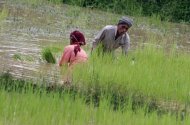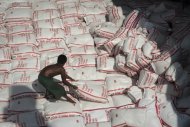Thailand's
status as the world's top rice exporter is under threat from a
controversial scheme to boost farmer incomes that has resulted in a
growing mountain of unsold stocks, experts warn.
Prime Minister Yingluck Shinawatra's year-old policy to buy rice from
farmers for 50 percent more than the market price has hit the
competitiveness of Thai exports, which are expected to almost halve in
2012."It's the worst year we have ever faced," said Chookiat Ophaswongse, honorary president of the Thai Rice Exporters Association.
"We are already losing our market share in the world to our competitors, especially the newcomers like Cambodia and Myanmar which are producing more and more rice for export," he told AFP.
Rice is the staple food for more than three billion people -- nearly half the world's population. Last year Thailand had nearly a third of the global export market.
But its worldwide share is forecast to drop to less than one-fifth in 2012, according to the US Department of Agriculture (USDA), which expects the Southeast Asian nation to fall behind rival exporters Vietnam and India.
Thailand produces about 20 million tonnes of rice each year on average, about half of which is normally sold overseas.
This year, however, exports are expected to reach only about 6.5 million tonnes, according to the exporter association and the USDA.
With its warehouses filling up quickly, Thailand is running out of space to house its unsold stocks and even briefly considered using an aircraft hanger in Bangkok's number two airport Don Mueang.
The longer the government holds on to the stocks, the bigger the drain on the public finances.
Yet experts say if Thailand abandons the scheme now, it risks flooding the world market.
"They are in a jam because with all this rice hanging around they have very little option to do anything else other than just keep on going because otherwise the rice price will drop and then they will have political problems," said Ammar Siamwalla, an economist with the Thailand Development Research Institute Foundation (TDRI).
"The Vietnamese and the Indians are rubbing their hands. They're taking advantage of the fact that we've slowed down our exports considerably," he said.
If Thailand tries to shift its glut of rice on world markets now, "the price would plummet," Ammar warned. "There is no exit strategy."
He estimates that Thailand has about 10 million tonnes of stock sitting around in storage. The USDA predicts the country will have stocks of about 9.4 million tonnes at the end of 2012 and 12.1 million tonnes in 2013.
China and India also have large stockpiles but their production and domestic consumption are much higher.
While the scheme is putting strains on Thailand's government finances, it has been welcomed by many farmers, whose support helped sweep Yingluck to a landslide election victory last year.
Her older brother Thaksin Shinawatra, who was ousted as prime minister by royalist generals in a coup in 2006, is hugely popular with Thailand's rural poor thanks to his populist policies while in power.
"I want the government scheme to continue because, at the very least, it helps us farmers sell our rice at a high price," said Supoj Joopia, who has 9.6 hectares (24 acres) of rice paddy in Chachoengsao province east of Bangkok.
He said his annual earnings from rice cultivation have soared by more than half to 780,000 baht ($25,000) since signing up.
About four million households rely to some extent on farming in Thailand, of which 900,000 have joined the scheme so far, according to the TDRI.
The policy is seen as benefiting owners of large farms in particular as they have a bigger surplus to sell to the authorities after their own household consumption. The scheme has also been dogged by allegations of corruption.
The government says it is confident that it can find buyers for its rice on world markets at a price that will raise the living standards of its farmers.
It says it has signed deals to sell rice directly to other countries.
Nigeria, Iraq, Indonesia, Ivory Coast and South Africa are the top customers so far this year, according to the Thai Board of Trade, which says exports slid 45 percent in January-September from a year earlier, to 5.0 million tonnes.
"We're still confident that we can keep releasing the rice that we have," Commerce Minister Boonsong Teriyapirom said earlier this month.
But not everyone is so optimistic and the fear is that Thailand might struggle to recapture lost market share.
"If the situation continues like this, you will see a lot of exporters gone out of business," Chookiat said.
More about the story
- Senate panel calls for urgent review of Thai rice subsidy scheme
- No-confidence debate to target Thai PM, Thaksin
- Euro debt crisis main threat to Thailand in 2013
- Thai woos private investors for Mekong development, Dawei port
- Electronics hit as Philippine exports plunge
- Asia Rubber-China, tyre makers buy as prices slip
- Thai court issues arrest warrant against Thaksin



ไม่มีความคิดเห็น:
แสดงความคิดเห็น